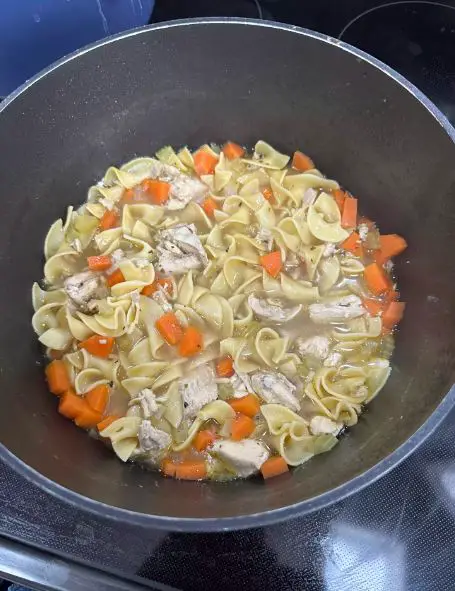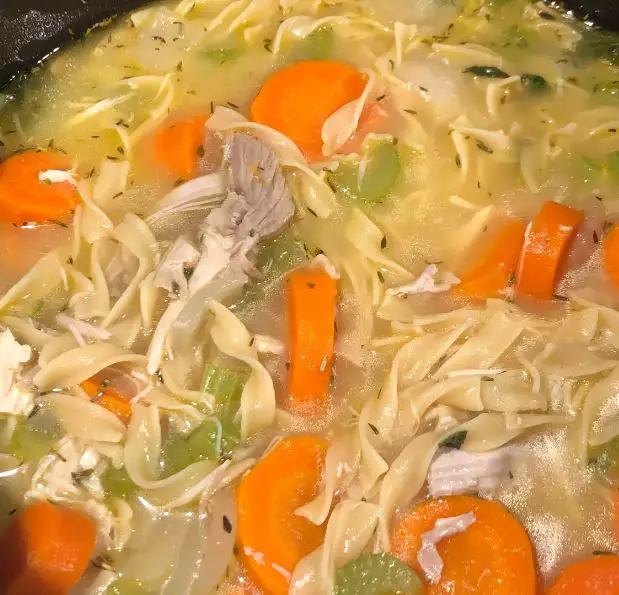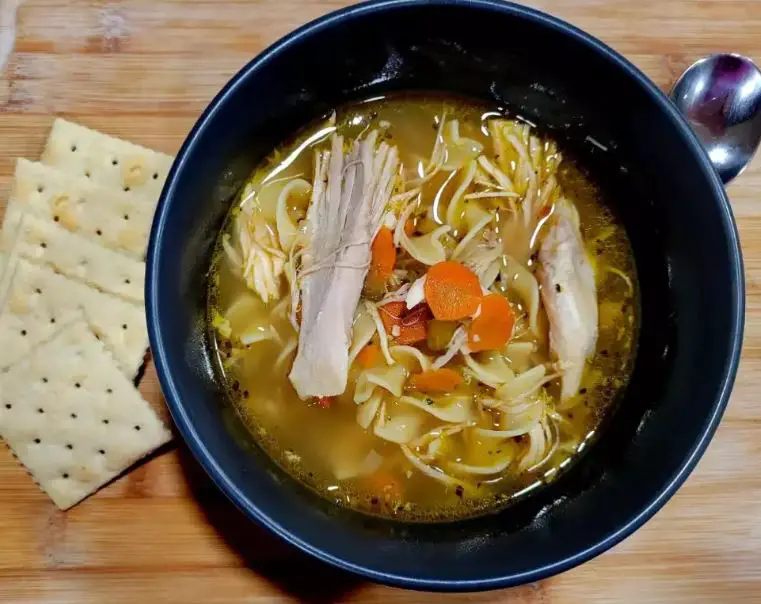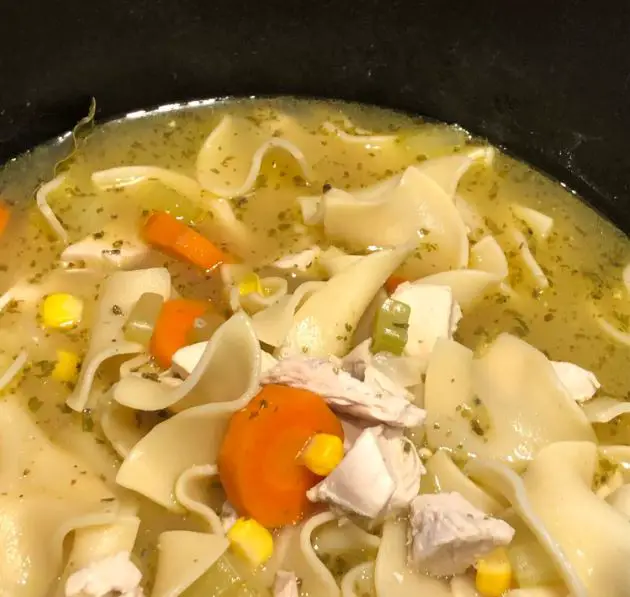Introduction to Freeze Chicken Noodle Soup
Freezing chicken noodle soup can be a game-changer for meal prep and storage. This guide explores the hows and whys, ensuring your soup remains delicious and safe.
Understanding Freezing Basics
Freezing chicken noodle soup involves balancing temperature and time. Your freezer should be at 0°F (-18°C) to effectively halt bacterial growth. Rapidly cool the soup before freezing to prevent large ice crystals, which can ruin texture. Use shallow containers or ice baths for quick cooling. Transfer the cooled soup to freezer-safe containers, leaving space for expansion. Label each container with the date. Properly frozen, chicken noodle soup can last 4-6 months, retaining freshness upon reheating.
Benefits of Freeze Chicken Noodle Soup
Freeze Chicken Noodle Soup saves time, reduces waste, and locks in flavors and nutrients. It’s a convenient solution for busy individuals, allowing for quick, healthy meals. Freezing also contributes to sustainable eating by preserving leftovers. Homemade frozen soup is healthier than store-bought versions, free from preservatives and excess sodium. It’s also a comforting choice for unexpected guests or sick days.
Selecting the Right Ingredients
Choosing the right ingredients is crucial for a delicious, freeze-friendly chicken noodle soup. Let’s explore the best vegetables and chicken types for your soup.
Choosing Soup-Friendly Vegetables
Select vegetables that withstand freezing and reheating for chicken noodle soup. Root vegetables like carrots, parsnips, and potatoes maintain texture well. Onions and celery add flavor and freeze nicely. Slightly undercook vegetables before freezing to avoid them becoming too soft upon reheating. Avoid high water content vegetables like zucchini or spinach, as they can become mushy. Cut vegetables into bite-sized pieces for even freezing and reheating.
Optimal Chicken Selection for Freezing
For freezer-friendly soup, choose boneless, skinless chicken breasts or thighs. Thighs add flavor and tenderness, while breasts are leaner. Cook chicken thoroughly before adding to the soup for safety. Roasted chicken can be used for richer flavor, but consider its higher fat content. Cut chicken into bite-sized pieces for even freezing and reheating. Quality chicken enhances the soup’s overall taste.
Preparation Before Freezing
Proper preparation is key to ensuring your chicken noodle soup freezes well and retains its quality.
Cooking Techniques for Freezing Chicken Noodle Soup
Cook your soup as usual, but with a slight twist for freezing. Slightly undercook vegetables and noodles to prevent them from becoming mushy when reheated. Use robust flavors and fresh herbs, as freezing can dull some tastes. This approach ensures the soup remains delicious even after freezing and reheating.
Cooling and Portioning Strategies
Rapid cooling is crucial. Spread the soup in shallow containers or use an ice bath for quick cooling. Then, portion the soup into meal-sized servings. This makes thawing more manageable and helps with portion control, reducing waste.

The Freezing Process
Effective freezing is essential for preserving your soup’s taste and texture.
Container Choices for Freezing
Opt for freezer-safe containers or bags. Containers should be airtight to prevent freezer burn, while bags save space and should be sturdy to avoid leaks.
Labeling and Sealing Techniques
Label each container with the soup’s name and freezing date. Ensure a tight seal to keep air out, maintaining the soup’s quality.
Thawing and Reheating Guidelines
Thawing and reheating correctly are crucial for enjoying your frozen soup.
Safe Thawing Methods
Thaw the soup in the refrigerator for several hours or overnight. Alternatively, use the microwave’s defrost setting. Avoid room temperature thawing to prevent bacterial growth.
Reheating for Best Flavor and Texture
Reheat on the stove over medium heat, stirring occasionally. If needed, add water or broth to adjust consistency. Avoid boiling to preserve the integrity of noodles and vegetables. For microwave reheating, use a microwave-safe container and cover it, stirring periodically.
Nutritional Considerations
Understanding the nutritional aspects of freezing chicken noodle soup is crucial for health-conscious individuals.
Nutrient Preservation in Freezing Chicken Noodle Soup
Freezing chicken noodle soup is an excellent way to preserve its nutritional value. The process of freezing can actually help retain the vitamins and minerals present in the soup’s ingredients. When vegetables and chicken are frozen shortly after cooking, their essential nutrients are locked in, making the soup just as healthy when thawed and reheated as when it was first prepared. It’s important to note that the method of cooling and freezing plays a significant role in this preservation. Rapid cooling and proper storage in airtight containers are key to minimizing nutrient loss. Additionally, the use of fresh, high-quality ingredients will further ensure that the soup is packed with beneficial nutrients.
Health Benefits of Chicken Noodle Soup
Chicken noodle soup is renowned for its health benefits. It’s a great source of protein, essential for muscle repair and growth, thanks to the chicken. The vegetables in the soup provide vitamins and minerals, while the broth is hydrating and can help clear nasal congestion. It’s also comforting and easy to digest, making it an ideal meal for those feeling under the weather. The soup’s warmth and steam can soothe sore throats and alleviate cold symptoms. Moreover, when homemade, it’s typically lower in sodium and free from preservatives, making it a healthier choice than many store-bought versions.

Freezing Homemade vs. Store-Bought Soup
Comparing the freezing of homemade chicken noodle soup with store-bought varieties reveals interesting differences.
Differences in Freezing Methods
Homemade and store-bought chicken noodle soups differ significantly in their preparation and freezing methods. Homemade soup often contains fresher ingredients and lacks the preservatives found in store-bought versions. This can affect how well the soup freezes and thaws. Homemade soup allows for control over the ingredients and their proportions, which can be adjusted for better freezing and thawing results. Store-bought soups are designed for longer shelf life and may contain additives that affect their texture and flavor after freezing.
Pros and Cons of Each
The main advantage of freezing homemade soup is the ability to control the ingredients, ensuring a healthier and more personalized meal. It’s usually fresher, with fewer additives, and can be tailored to personal taste preferences. However, it requires time and effort to prepare. Store-bought soup, on the other hand, offers convenience and consistency. It’s a quick and easy option, but often at the cost of higher sodium content and the presence of preservatives. The choice between homemade and store-bought ultimately depends on individual preferences for convenience, health, and taste.
For Those Who love the warmth of comforting soups, be sure to check out more similar soup recipes available on my blog for more culinary inspiration:
- How To Make Pastina Soup ( 3 Recipes )
- What Goes With Potato Soup
- Busy Day Soup
- What To Eat With Tomato Soup
- Is Miso Soup Gluten Free?
Common Freezing Mistakes
Avoiding common mistakes is crucial for preserving the quality of frozen chicken noodle soup.
Avoiding Freezer Burn
Freezer burn, a common issue, occurs when air reaches the food’s surface, leading to dehydration and oxidation. To prevent this, ensure your soup is cooled completely before freezing and use airtight, freezer-safe containers or bags. Removing as much air as possible from bags and ensuring containers are sealed tightly can significantly reduce the risk of freezer burn, preserving the soup’s texture and flavor.
Portion Size and Storage Duration
Another mistake is freezing soup in large batches that can’t be consumed quickly. Instead, freeze soup in individual or family-sized portions for easier thawing and consumption. Also, be mindful of storage duration. While frozen chicken noodle soup can last several months, its quality is best within 2-3 months of freezing. Label each container with the freezing date to keep track of its shelf life.
Freezing Soup in Different Climates
Freezing soup effectively can vary depending on your climate.
Adjustments for Humid vs. Dry Climates
In humid climates, moisture can lead to freezer burn or ice crystal formation. Use moisture-resistant containers and ensure your freezer is set to the correct temperature to combat this. In dry climates, the risk of dehydration is higher, so airtight packaging is essential to retain the soup’s moisture.
Seasonal Considerations
Seasonal changes can affect your freezer’s efficiency and the soup’s freezing process. In warmer months, ensure your freezer is not overloaded and maintains a consistent temperature. During colder months, your freezer might work more efficiently, but always monitor the temperature settings.
Cost-Effectiveness of Freezing Soup
Freezing chicken noodle soup can be a budget-friendly kitchen strategy.
Budget-Friendly Tips
Making large batches of soup and freezing it can save money in the long run. Buying ingredients in bulk, especially when they are in season or on sale, can reduce costs. Using homemade stock or leftovers as soup bases can also be economical.
Comparing Costs: Homemade vs. Store-Bought
Homemade soup generally proves more cost-effective than store-bought versions. While the initial investment in ingredients might seem higher, it yields more servings. Store-bought soups, although convenient, often come with a higher price tag, especially for healthier or organic options. Additionally, homemade soup allows for customization, letting you make nutritious meals without expensive ingredients.
Soup Storage Solutions
Effective storage solutions are key to maximizing the lifespan and quality of your frozen chicken noodle soup.
Organizing Your Freezer for Efficiency
Organize your freezer to ensure efficient use of space and easy access to your soup. Group similar items together and keep a designated area for your frozen soups. Use stackable containers or flat freezer bags to save space. Regularly rotate the contents, placing newer batches behind older ones, to use the soup within its optimal timeframe.
Long-Term Storage Tips
For long-term storage, ensure your soup is packed in airtight containers or heavy-duty freezer bags to prevent freezer burn. Label each container with the contents and date of freezing. Regularly check your freezer’s temperature, keeping it at or below 0°F (-18°C) for the best preservation.
Reviving Frozen Soup
Thawing and reheating frozen soup correctly can help maintain its flavor and texture.
Enhancing Flavor Post-Freezing
After thawing, you might need to enhance the soup’s flavor. Add fresh herbs, a squeeze of lemon juice, or a pinch of salt to revive its taste. If the soup has thickened, a bit of water or broth can bring it back to the right consistency.
Quick Fixes for Common Issues
If the noodles or vegetables have become too soft, add a handful of fresh ones while reheating. For soups that have separated, a gentle stir on the stove can help recombine the ingredients.
Freezing Soup for Health and Wellness
Incorporating frozen soup into your diet can contribute to health and wellness.
Soup as a Part of a Healthy Diet
Chicken noodle soup, especially homemade, can be a nutritious addition to any diet. It’s typically low in calories, high in protein, and packed with vegetables. Freezing soup ensures you have a healthy meal option available, reducing the temptation to opt for less nutritious, convenience foods.
Benefits of Soup in Meal Planning
Having soup readily available in the freezer aids in meal planning, ensuring you have quick, healthy meals on hand. This can be particularly beneficial for busy individuals, those watching their diet, or anyone looking to add wholesome, comforting food to their meal rotation. Regularly consuming soup can contribute to hydration, provide essential nutrients, and can be especially comforting during colder months or when you’re feeling unwell.
Freezing Soup in Bulk
Freezing soup in large quantities can be a smart, time-saving kitchen strategy.
Strategies for Large Quantity Freezing
When freezing soup in bulk, cook in large batches, ensuring consistent quality across the entire batch. After cooking, cool the soup rapidly in shallow containers or an ice bath to prevent bacterial growth. Once cooled, portion the soup into manageable sizes, considering how much would be consumed in one meal. This makes it easier to thaw and reheat without wasting any soup.
Managing Freezer Space Effectively
Effective freezer space management is crucial when storing large quantities of soup. Use stackable containers or flat freezer bags to maximize space. Organize the freezer by grouping similar items together and placing older items in front for easy access and rotation. Regularly check and organize the freezer to avoid overfilling, which can affect its efficiency.

Conclusion
Let’s recap the key points for successfully freezing chicken noodle soup.
Recap of Key Points
- Rapid cooling and proper portioning are essential for preserving soup quality.
- Use airtight, freezer-safe containers or bags to prevent freezer burn.
- Label each container with the date and contents for easy identification.
- Thaw safely in the refrigerator or using a microwave, and reheat gently to preserve texture and flavor.
- Freezing soup in bulk requires careful planning and efficient use of freezer space.
Encouraging Sustainable and Healthy Eating Habits
Freezing chicken noodle soup aligns with sustainable and healthy eating practices. It allows for better portion control, reduces food waste, and ensures a nutritious meal is always on hand. This method supports a balanced diet and can contribute to a more sustainable lifestyle by minimizing food waste and reliance on less healthy, processed food options.
Some Other Soup Recipes To Enjoy:


